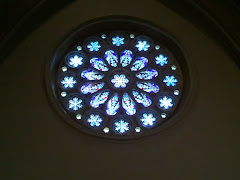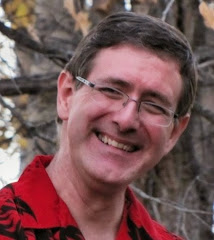Scripture: 1 John 3:1-3: See what love the Father has given us, that we should be called children of God; and that is what we are. The reason the world does not know us is that it did not know him. 2 Beloved, we are God's children now; what we will be has not yet been revealed. What we do know is this: when he is revealed, we will be like him, for we will see him as he is. 3 And all who have this hope in him purify themselves, just as he is pure.
When you meet someone you don’t know, how do you tell them
who you are? Dogs have it easy, they
sniff each other and figure it out through smell. Cats study each other, goldfish don’t care as
long as they can get to their food pellets, and lobsters are too territorial to
want to get friendly. We humans use
words.
Hi, I’m Monica and I’m…
And we fill in the blanks and look for something we have in common. I’m a big Abba fan, a small Star Trek fan or
whatever. What can we talk about together,
what are our shared joys and passions?
We may often say, I am an electrician, a teacher, a doctor, a
dancer, a retiree. That describes what
we do, but not who we are. We might say,
I’m a daughter, a grandfather, a kokum, a niece, but that describes how we are
connected to others but not who we are.
We could say, I’m a drunk, a cancer victim, a video game addict, a
workaholic, a busybody, and so on, but that describes what we are struggling
with, but still not necessarily who we are.
First John says something quite strange and ground-breaking. We are children of God. That is an odd point of view. If you look at Greek or Roman mythology,
humans are toys and playthings of the Gods.
Zeus is always looking for a cute young human to flirt with, and the
Trojan War was seen as the equivalent of a chess game between Zeus, Aphrodite,
Apollo and Athena, who each had their favorite hero to side with. Egypt’s gods were to be served by humans and
they would judge and sort them out for the afterlife.
The Babylonian Gods saw humans as created from the blood of a
murdered God, and as a source of nourishment.
The burnt offerings the humans made in their worship was food for Marduk
and the others. The flood, according to
the Babylonians, occurred because one of the goddesses wanted her beauty sleep
and thought the humans were too noisy.
What a radical idea, being children of God. It’s still today a radical idea. People sometimes believe that they are a
product of their dna, or as I heard at a funeral this week, we are all star
dust that has been a part of the universe for millions of years. I remember people involved in the New Age
movement claiming that they were God in their own right, and that when they
remembered who they were, prosperity and health were sure to follow, because
they were creators of their own lives. That
was before the economic downturn of 2008.
What does it mean to be children of God? Elsewhere in the scriptures, it talks about
how we are adopted to be God’s children, to become like Jesus. Adoption in the ancient world was a very
different thing than it is now. Often
adoption is done for the sake of providing children with a healthy family life
that we hope is stable and nurturing, with the assumption that their birth
family may not be so healthy. It is a
private thing that is not necessarily a part of changing a child’s identity,
but adding to it. The ancient world saw
it more as a transaction, between unequal people. A rich roman citizen would adopt a suitable
young person to be the heir to their property.
It was a legal tool for providing childless couples with healthcare and
protection for their aging years. Often
the young person’s family would be given a large sum of money and encouraged to
sever all ties with the child. It was a
purchase, and a step up in the world.
If God has adopted us, then, First John wants us to consider
the implications of such a situation. We
are no longer part of a human family but a community of saints, elders, disciples
and messengers. We are also works in
progress. Remember the t-shirt that said,
“be patient with me, God isn’t finished with me yet” 1 John says, “what we will be is not yet
revealed, what we do know is this, when he is revealed, we will be like
him.” This is a reminder that while we
can and should do our best to work on who we are and how we are to others, this
is a partnership. Just as the rich
citizen teaches his new child, so too God is in the process of shaping us into
heirs as well. We can work ourselves
into frenzies trying to become perfect, but this is really saying that we are
Gods, and not the children of God. There’s
also the added challenge of how the world sees us. When we truly take this seriously, people
don’t get it. “Why are you so nice,”
they ask. “How come you care about
people like that?”
There’s a fellow who is selling pizza in Philadelphia. One day a customer came in and asked if he
could pay it forward, buy a pizza for someone who couldn’t afford it. The store owner grabbed a sticky note, wrote
a voucher and stuck it on the wall. Then,
he asked his customers if they would like to pay it forward. Everyone who goes to the restaurant and
donates $1.25 when they buy a pizza, gets a sticky note. They can write whatever they want on the
note, encouragement, hope or whatever they feel like. The wall of the restaurant is covered with
notes. People come in, pick a sticky
note to take with them to encourage them as well as a slice of food that
doesn’t taste mass produced. Customers
have given away ten thousand pizzas! Some
are coming back, saying that they got free pizza and now have a job and want to
buy pizza for others.
There were people who angrily attacked the idea as silly, as
enabling, as supporting people in their laziness, as allowing welfare bums to
not take responsibility for their lives.
They don’t get it. They don’t
understand that as children of God, we are called to a bigger picture. As children of God, we trust in an Easter
resurrection, even when it seems crazy and irrational. We remember who we are and who we belong to,
which gives us the power and the courage to see Jesus alive and living in ways
that the cynics can’t understand. Life
is crazy, but we’re not alone and thank goodness God isn’t finished with us
yet. That is worth saying halleluiah
for.

